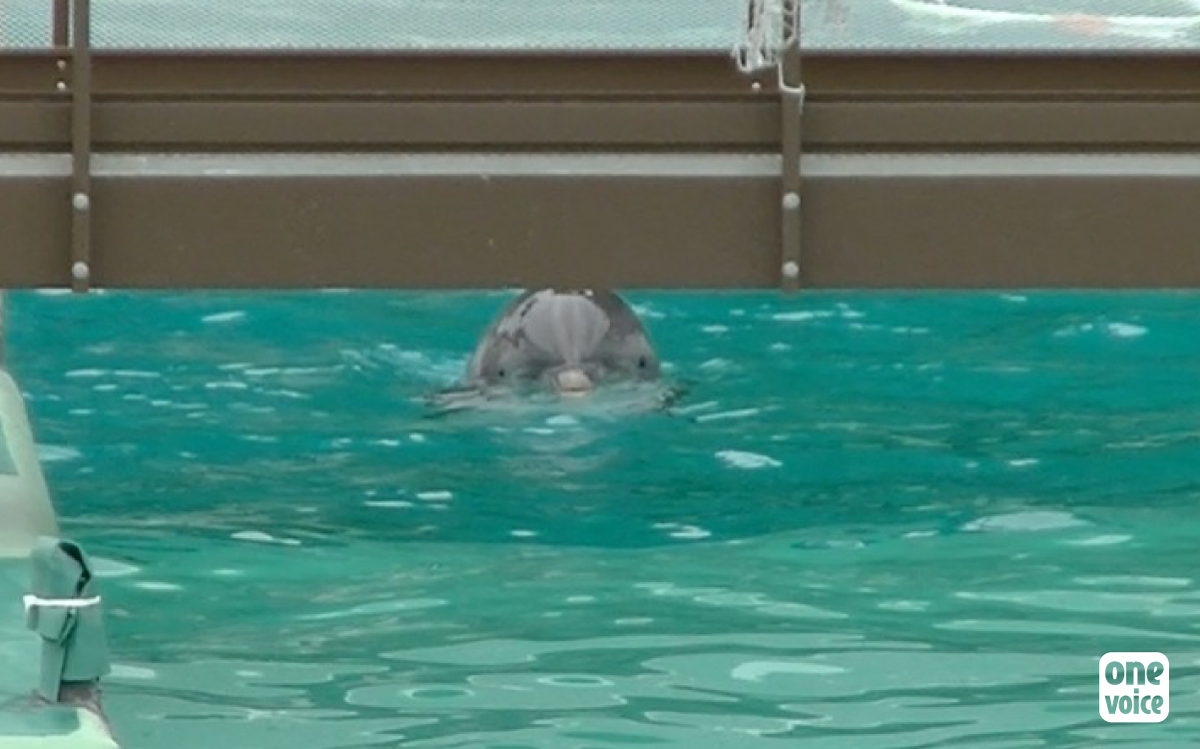

Lucille, exiled dolphin at Port-Saint-Père
In August 2015, Lucille killed the first baby dolphin born at Planet Sauvage in a fight. This dreadful act, which she immediately regretted, was not random or “natural behaviour”. Sadly, it was predictable given Lucilles state of despair.
From SeaWorld to Harderwijk
Lucille was born at SeaWorld, Orlando the 16th of April 1989 to Louise and Ralph, who were caught in the ocean. She was on exhibition in the Dolphin nursery of the park as a baby, before being brought to Dolphin Cove, where she could be stroked by a continual flow of visitors, for 45 dollars a time.
On the 7th of June 1997, the decision was made to send her to Europe. A heartbreaking departure for Lucille, who would never see her mother again. The Hardenwijk dolphin aquarium needed reproductive females, and despite being so young, Lucille would go on to have two sons.
The 7th April 2015, Lucille was uprooted once again: sent to Planet Sauvage and its mostly male population. This was a huge upheaval having spent the last eighteen years in the lagoon at Harderwijk. Despite having a difficult time, the SeaWorld exile eventually managed to find her place in the tough world of captive dolphins. She even managed to bring up her babies there. However, once again she was taken away, this time from her sons who were now adults, but allies in the violent world of overcrowded pools.
So Lucille arrives at Port-Saint-Père to a pool full of strangers. Since the much contested opening of the dolphinarium in 2008 (see OneVoice’s fight for cetaceans), relationships have been formed. Living there are previous tenants from Parc Astérix, Péos, Aicko and Galéo, as well as a hot headed youngster that has just arrived from Océan, Bruges. The two females, Parel and Amtan, come from Harderwijk, where they have crossed Lucille before. All of these young dolphins have been born in captivity, separated much too early from their mother, and are lacking in social maturity. The cohesion of this small artificial ‘family’ of four males and three females confined into the same space is maintained only under the tight control of their trainers.
Upon arrival, Lucille slips into a depression, refusing to leave the quarantine basin. This greatly worries One Voice, but the Dolphinarium refuses to admit to a problem. Then Parel gives birth to her first baby, and needs a Godmother to help look after her. This is an essential societal dolphin role which relies on tight links between two adult females. It is a relationship of trust which forms over time, and not from an imposed human choice. But in June 2015, Lucille is given this task of taking care of Parel, just three months after her transfer, when she has chosen to isolate herself from everybody! It doesn’t go well…
Just a fight between females
The 8th of August 2015, the spectators are waiting for the show to begin. Lucille, Parel and her baby are enclosed in adjoining Basin no.4 when suddenly an agitation erupts in the tiny enclosure. In front of the stunned public, the two females try to resuscitate the dead baby dolphin by holding him to the surface. There is total confusion but the music is put on anyway and the show begins. The baby’s body is discretely removed from the pool with a net whilst the five dolphins appear on scene, too upset to concentrate on their routine…
Dolphin’s Society
When questioned about Lucille’s depression in May 2015, the dolphinarium responded that “The natural social organisation of dolphins consists of movement between groups with new individuals arriving and others leaving, to avoid inbreeding. We do exactly the same thing. Management between parks is organised at a European level by species coordinators (the EEP)”
But in reality, the young don’t ever really leave their family, they are weaned at the age of three and become distanced from the family clan but they remain connected their whole life by the dialect and culture. Female dolphins in particular stay in their clan a long time to bring up their children in collective nurseries. When the clans become too big, they split and multiply in the same territory. Dolphins have countries like us. Lucille’s parents were almost certainly from Florida Keys.
It is therefore wrong to claim that dolphins leave without returning from the age of three. In the wild, a matriarch doesn’t abandon her tribe. These situations are never seen in nature, any more than the fatal brawls between a young mother and her baby’s ‘Godmother’.
Lucille’s story dramatically reminds us that moving a dolphin from one dolphinarium to another always ends with serious consequences, as recognised since the 60’s. A dolphinarium can never replicate the natural migration or the complexity of dolphin’s society. These transfers are necessary for the survival of the doplhinariums and not of the dolphins themselves.
Lucilles suffering is just one case in many. This suffering will not end until the day that the dolphinariums discontinue these cruel EEP programmes and stop exploiting these beings who have feelings and emotions just like you and I.
Sign and share our petition for the closure of these dolphinariums!